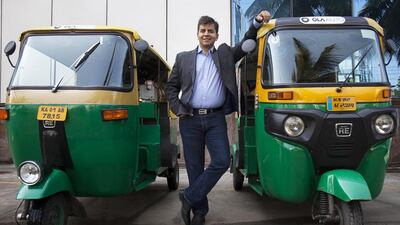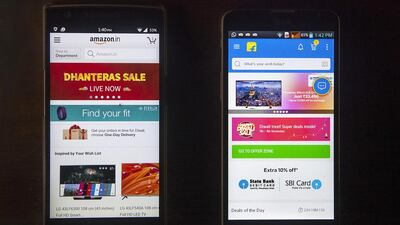MUMBAI // The heads of two major companies, Flipkart, which is India’s answer to Amazon, and Ola, which is the Indian equivalent of Uber, this month voiced their concerns at a conference in Bangalore about foreign rivals and called upon the government to introduce measures to protect home-grown brands.
India has been increasingly opening up to more foreign investment, with prime minister Narendra Modi asserting that “India is now the most open economy in the world for FDI [foreign direct investment]”, as he this year introduced a slew of steps to liberalise the FDI regime further, in sectors ranging from retail to aviation and defence.
But not everyone is on board, as companies such as Flipkart and Ola feel the heat from American rivals that served as inspiration for their business models. Flipkart has been struggling as Amazon has rapidly gained market share in the Indian e-commerce market. Meanwhile, Ola is having to compete as Uber uses the extensive funding it has to offer steep discounts to essentially “buy” customers.
“What we need to do is tell the world we need your capital, but we don’t need your companies,” Sachin Bansal, a co-founder and executive chairman of Flipkart, told the conference. “We need to do what China did.”
Bhavish Aggarwal, a co-founder and chief executive of Ola, meanwhile, said Indian companies were at a disadvantage because there was little local capital available for them and they had to go abroad to raise investment, while foreign companies had access to more funds.
“It’s a very unfair playing field for the Indian start-ups and something needs to be done about it,” he said.
This has sparked much debate over the matter in India. Other experts say that India has come a long way since it first liberalised its economy in the 1990s and opened up to foreign brands, and that ultimately allowing overseas companies into India generates a raft of benefits for the country.
"The role of the government is to create a level-playing field and the market will pick the winner," Samar Singla, the chief executive and founder of Jugnoo, an Indian ride-hailing app for auto rickshaws, told The National.
“Companies should focus on innovation instead of playing the nationalism card fearing competition.”
Others say that firms such as Ola and Flipkart want to have their cake and eat it too. Essentially they want access to foreign funds and the freedom of foreign firms operating in India to be curtailed.
“All incumbents like to protect their own market and whilst Indian companies in certain sectors may face increased competition, they have also benefited from globalisation, which has provided them with access to new markets and capital,” says Nikhil Narayanan, a partner at Khaitan and Co, a law firm. “On balance, we think that most Indian companies are happier with the current and more open economy than the closed economy of the past.”
Also, it is not only the views of Indian companies that should be taken into consideration.
“Consumers have benefited from increased choice and competition over the past 25 years, so is halting or reversing that trend desirable or even possible?”
And foreign firms bring sizeable benefit to the wider economy.
“It is increasingly difficult to credibly make a ‘national champion’ argument,” says Mr Narayanan. “Local monopolies or oligopolies have not proved to be economically efficient in many parts of the world. Ultimately, if employment is generated in India and investment is made in India, does the national affiliation of a company really matter? Indeed, is there even such a thing as national affiliation when companies have shareholders from different parts of the world and operations across the globe?”
But some point out that more does need to be done to nurture entrepreneurship and start-ups, as well as lending support to home-grown companies.
“Markets like India have their own intricacies that you have to be careful of. For example, the immense penetration of small retail shops in India,” says Venugopal Ganganna, the chief executive of Langoor, a digital marketing agency headquartered in Bangalore. “Allowing foreign investment cannot come at their expense.”
When India in 2012 first announced that it was paving the way for the entry of foreign supermarkets, as it relaxed FDI regulations, there were widespread protests across the country, as the ubiquitous “mom and pop” stores feared they will be put out of business by these supermarkets. Although there is interest, overseas supermarket giants such as Tesco and Wal-Mart have yet to open large shops, so the impact remains to be seen.
But Mr Ganganna thinks that there have to be limits on how far the authorities go when it comes to promoting local interests.
“Governments around the world often offer incentives to local businesses to ensure employment and independent growth,” he says. “India should and will likely build in measures independent of the proposed lobby recently in the news, and enable local entrepreneurship and growth. Indian businesses want a government to support them effectively. But beyond that, extra protectionism does not make a lot of sense. Fundamentally Indian companies have benefited from foreign investment and the foreign competition is keeping them honest.”
He adds: “Additionally, we as a business operate outside India and we want to compete on an even playing field in those markets. As a result, we should give the same respect to foreign companies entering India.”
Indian brands that offer good products and that work hard to keep up with their overseas rivals should be able to compete effectively and survive, as many have done so far, other business leaders say.
“Indian companies have withstood competition from foreign companies in the past,” says M P Ahammed, the chairman of the Kerala-based Malabar Group, best known for its retail jewellery division.“For example, Parle weathered the onslaught of Coca-Cola and Pepsi, and Infosys withstood Microsoft and Oracle. This is also the case with FMCG and consumer durables companies. Healthy competition with quality products from foreign companies will help the Indian brands grow exponentially.”
While there is no doubt that the entry of overseas companies will give Indian firms a run for their money, there is recognition that allowing more foreign brands is ultimately a sign of economic progress for the country.
“The retail industry has always been a very competitive market and especially with the entry of more and more international brands, it has become even more so,” says Nina Lekhi, the managing director of Baggit, a handbag brand.
Increased competition means that retailers often have to discount to stay competitive, she says.
“On a personal note, I am glad that international brands are now present in India and that you don’t have to travel and buy everything for the year. Now we can stop by a store just before any event and get exactly what we want. So it is fantastic to have international brands over here in our country.”
business@thenational.ae
Follow The National's Business section on Twitter




